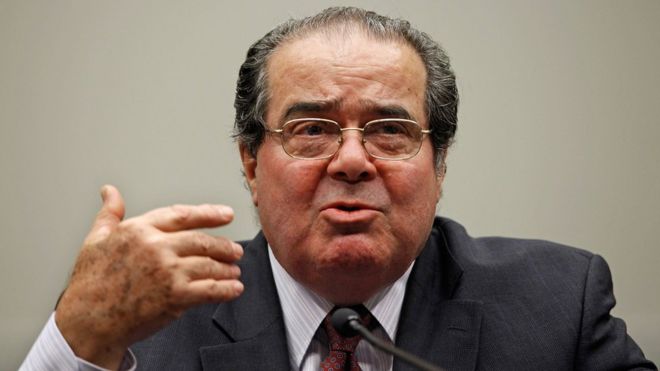
One of the most conservative members of the US Supreme Court, Antonin Scalia, has died.
Justice Scalia's death could shift the balance of power on the US high court, allowing President Barack Obama to add a fifth liberal justice to the bench.
The court's conservative 5-4 majority has recently stalled major efforts by the Obama administration on climate change and immigration.
Justice Scalia, 79, was appointed by President Ronald Reagan in 1986.
He died in his sleep early on Saturday while in West Texas for hunting trip, the US Marshalls Service said.
"For almost 30 years, Justice Scalia was a larger-than-life presence on the bench," President Obama said, calling him "an extraordinary judicial thinker" with "an incisive wit".
The president said he intends to name a replacement in due time, despite calls from Republicans to wait until the next president is elected.
"There will be plenty of time for me to do so and for the Senate to fulfil its responsibility to give that person a fair hearing and a timely vote," Mr Obama said.
"He was an extraordinary individual and jurist, admired and treasured by his colleagues," Chief Justice John Roberts said in a statement. "His passing is a great loss to the court and the country he so loyally served."
Born in 1936 in Trenton, New Jersey, Justice Scalia was the first Italian American to serve on the high court.
He was one of the most prominent proponents of "originalism" - a conservative legal philosophy that believes the US Constitution has a fixed meaning and does not change with the times.
In 2008, Justice Scalia delivered the opinion in District of Columbia v Heller, a landmark case that affirmed an individual's right to possess a handgun.
Throughout his career, the outspoken justice has been a vocal opponent of abortion and gay rights, often writing scathing dissenting opinions.
In the majority, he supported business interests and was a strong advocate for the death penalty, but he often parted with his conservative colleagues on issues of free speech.
He was known for his sense of humour and colourful language, calling efforts to defend President Obama's healthcare reform law "jiggery-pokery" and "pure applesauce".
Justice Scalia was an avid questioner during the court's oral arguments and has been credited with livening up proceedings.
His biting legal opinions and colourful persona made him a celebrity in conservative legal circles and, to a lesser extent, among the general public.
Politics turned on its head: Anthony Zurcher, BBC News North America reporter
The death of Antonin Scalia has turned the US presidential race, and Washington politics, on its head.
The ability of a president to shape the Supreme Court for years if not decades has been an important consideration for many voters in US presidential campaigns - but it is usually an abstract concern. With the passing of conservative firebrand Scalia, that is no longer the case.
Republicans in the US Senate will do everything they can to prevent Barack Obama, who has fewer than 11 months left in his presidency, from naming a successor to a court that had been sharply divided between liberals and conservatives.
If they succeed, a Democratic victory in November would mean a court with a decidedly more liberal bent. If Republicans prevail they preserve their slender conservative majority on a court that regularly issues landmark decisions on issues like gay rights, immigration law, healthcare reform, campaign finance reform and civil liberties.
Even if Mr Obama gets a nominee confirmed, the power his successor will hold to appoint justices is clear - three of the eight remaining justices are over the age of 70.
Justice Scalia was the subject of a one-act play and the focus of an opera along with his friend and colleague liberal Justice Ruth Bader Ginsburg.
The appointment of Justice Scalia's successor is certain to become a major issue in the presidential race, with stark divisions emerging over whether he or she should be nominated by this president or the next.
Senate Majority Leader Mitch McConnell, a Kentucky Republican, said on Saturday that the new justice should be selected after the presidential election.
"The American people should have a voice in the selection of their next Supreme Court Justice," he said.
His stance was echoed by Republican presidential candidates including senators Ted Cruz and Marco Rubio.
Senator Harry Reid, the top Democrat in the chamber, called the move to delay the confirmation "unprecedented".
"The Republicans in the Senate and on the campaign trail who are calling for Justice Scalia's seat to remain vacant dishonour our constitution," Democratic presidential candidate Hillary Clinton said. "The Senate has a constitutional responsibility here that it cannot abdicate for partisan political reasons."
The Supreme Court will continue to hear cases during the current term, with or without a replacement, including a major case involving abortion rights.
US Supreme Court justices are appointed to life terms by the president with the approval of the US Senate.
The length of their terms along with their influence on US politics makes their selection and confirmation hotly debated.
Appointed by Democratic presidents, associate justices Mrs Ginsburg, 82, Sonia Sotomayor, 61, Stephen Breyer, 77, and Elena Kagan, 55, make up the court's liberal wing.
Appointed by Republican presidents, Chief Justice John Roberts, 61, along with justices Clarence Thomas, 67, Anthony Kennedy, 79, and Samuel Alito, 65, are the court's conservative bloc.



No comments:
Post a Comment